|
FAQs about Acroporid
Eating Red/Black "Bugs" (Tegastes,
Copepods)
Related Articles: Coral Pests and Disease; pests, predators,
diseases and conditions by Sara Mavinkurve, Acroporids, SPS
Corals,
Related FAQs: Acroporid
Disease 1, Acroporid Disease 2,
Acroporid Disease 3, Acroporid Disease 4, Acroporid Health 5, Acroporid Health 6, & Acroporids 1, Acroporids 2, Acroporid Identification, Acroporid Behavior, Acroporid Selection, Acroporid Compatibility, Acroporid Feeding, Acroporid Systems, Acroporid Reproduction, Stony/True Coral, Coral System Set-Up, Coral System Lighting, Stony Coral Identification, Stony Coral Selection, Coral Placement, Foods/Feeding/Nutrition, Disease/Health, Propagation, Growing Reef Corals, Stony Coral Behavior,
|
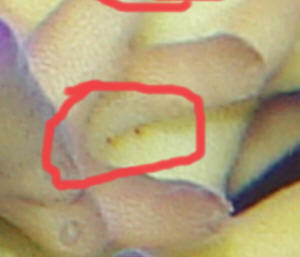
|
Acro Spots 7/15/19
Bob,
<Eric>
Are you able to see videos on YouTube?
<Sure; was just watching "Hot Ones" there last night>
I can not catch one of these bugs to view under a microscope and I can never
find them in the bucket after dipping the coral. Been trying all day. I got a
very close video of my slimer who lost all polyp extension. Is this an Acro pest
or a pod? Item moves like a Red Bug but is grayish / black.
https://youtu.be/D54AeyaPYzw
<Where is this in the field of view? Bob Fenner>
<Looked again, near the top ... there are two ... from the size, shape, and
movement these do look like Tegastes to me. B>
Re: Acro Spots 7/15/19
I have noticed them on all my Acros. I should definitely treat the tank with
Interceptor right?
<Yes I would; ASAPractical. BobF>
Re: Acro Spots 9/11/19
Bob,
<Eric>
Treated the tank last night with Interceptor. Lost a few hermits but my
large shrimp and crabs made it through.
<... better to treat the stony corals outside the main system to avoid such
crustacean losses>
Unfortunately so did the bugs. I am assuming the next course of action is to do
a larger dose over a longer time period?
<Mmm; no. You DID turn off all mechanical filtration during treatment? The
skimmer, contactor/s, UV...?
I would re/treat ONLY at the standard dose/regimen.>
I did the standard dose over 6 hours. Is it feasible to try and treat one of the
infected pieces in a separate bucket to gauge what dosage will actually work?
<Yes>
I cant catch my shrimp so was trying to do my best to make sure they made it
through okay.
<... again, do you have another established system, container you can/might move
the Acropora to after treatment outside this system? Bob Fenner>
Thanks,
Eric
Re: Acro Spots
Bob,
<Eric>
So it seems like over the 48 hours after the interceptor treatment the bug
population is down substantially. In fact I only see them left on one Acro. I am
also not sure if what I am seeing are just small pods as they look a lot smaller
and move a lot faster than the other ones.
<Okay>
Unfortunately I do not have an extra tank that can handle Acros. What I am going
to do is remove the few pieces and the 1 that has active bugs and dip outside
the tank.
<All right...>
I will then monitor from there. I can say though that my DKH dropped from 9 to
7.8 after the treatment so I am assuming the lower value was caused by the
corals starting to grow again
<... or other effect.>
which shows the interceptor definitely had some impact.
<Yeah mate; it's a selective (more/less) poison. B>
|
Black bugs from hell
10/19/16
Hi crew,
<Fahd>
Hope things are well with you all.
<Yes; thank you>
I'm hoping to get an I.d plus possibly some advice on treating these little
buggers (pun intended).
I have included some pictures that I took, you can see how small they are on
the rocks, and I was able to capture some and look at them under a
microscope at my university.
They run around quite fast on the rocks, in random patterns, especially when
a flashlight has been shone on them.
These bugs tend to target lps corals, and are leaving my sps alone. They
seem to hit one or two coral at a time, rather than to infect all of them at
once. For example I would see slow recession on one or two frags at a time.
<Mmm... infect? Nah... not even infest... >
Dipping frags in iodine had no effect. Dipping them in coral cleaner
"revive" had no effect.
After much reading online, I found out that the drug interceptor, with
active ingredient Melbemycine oxime seems to have worked for others in the
past with similar pests.
<Yes... this appears to be a copepod/ite... the single eye....>
One large tablet of interceptor is meant to treat 380 gallons. My aquarium
is roughly 85-95 gallons of water, therefore the first treatment consisted
of .25 of a full tablet. This had no affect on the bugs and they were still
running around on the live rock.
<Heeeee!>
Then I treated the aquarium (without water change or carbon to remove the
first treatment) with 1 full tablet, knowing that overdosing is not known to
cause any major issues. This yielded no ill effect on the bugs.
Finally, I got very annoyed and used all my remaining interceptor; 2.5
tablets, which came out to roughly 10x the suggested treatment strength.
This, finally, caused the bugs to seemingly die, as I no longer saw them
running around on the rock.
The affected lps also looked much puffier and happier after the final
treatment, with receding seeming to stop.
That was a week ago, and today I noticed that 2-3 bugs were running around
on the rocks again (compared to seeing about 20 on the same spot of rock
originally). I'm assuming that some eggs may have hatched or something.
These bugs have cost me a small fortune in coral frags
<Really? As in eating them?>
and treatment costs, and any advice with a possible i.d would be much
appreciated. Any thoughts on alternative treatment options?
<A few... I'd use a predator...>
Is interceptor my best bet at this point? It's bizarre that they need such a
strong treatment.
<Something/s absorbing the arthrocide here... Happens all too often...
Chemical filtrants, "bio mass"... detritus>
Thank you for your time, enjoy your day.
Fahd.
<Let's have you read here:
http://www.wetwebmedia.com/ca/volume_5/volume_5_2/copepods.htm
and the linked files at the bottom. Bob Fenner>
|


Re: Black bugs from hell.
10/20/16
Thanks, Bob. I saw your response and agree. Heeee - it's a cyclopepod!
Take care, Lynn
<Heeee! Thank you Lynn. BobF>
Re: Black bugs from hell.
10/21/16
Thanks, Bob. I saw your response and agree. Heeee - it's a cyclopepod!
Take care, Lynn
<Heeee! Thank you Lynn. BobF>
<<A pleasure, as always! Lynn>>
|
|
Acropora black bugs 5/4/16
Hey I was wondering if someone might possibly have some info about a problem
I am having. I have black "bugs" on some Acropora.
<Happens>
I have treated my tank with interceptor and it didn't kill them.
<Interesting... might want to try a biological predator... some small
wrasses, pipes...>
Killed off a lot of other stuff. Also I have dipped these corals in Coral
Pro RX, Revive, Bayer at triple strength and nothing has worked.
<Strange... and frightening>
They seem indestructible. I am not considering drying everything out.
They only seem to affect the across. But I left the tank empty of those for
a few weeks and when I place a frag in they have come right back. I am not
sure if these bugs can survive on detritus or other food and maybe stick
around even for prolonged periods of time.
Any help you might be able to offer would be greatly appreciated.
Thank you, Brad V.Greensboro, NC
<I'd REALLY like you to collect some, take their pic under magnification...
and send along for Identification.
Otherwise, re bio-controls, please read here:
http://www.wetwebmedia.com/AcroBugF.htm
Bob Fenner>
Re: Acropora black bugs 5/4/16
This is the best I have been able to get so far. Will keep trying
though.
Also here's a video but not great quality. Acropora bugs! Not red bugs
<Mate.... these look like flatworms... BobF>
|
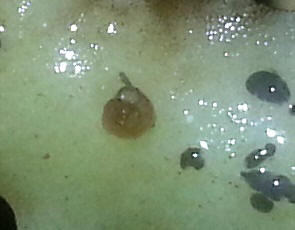 specks?
specks? |
|
Re: Acropora black bugs
5/4/16
the grey spots?
did you see the video?
<No... the link doesn't work... practice sending it to yourself and re-send>
do they swim like that? I know the bites look the same as flatworm bites.
Thank you for your patience.
Re: Acropora black bugs 5/4/16
Acropora bugs! Not red bugs
<?>
Re: Acropora black bugs 5/4/16
I sent the link ... didn't get it? Here goes again
<... worthless. Do you make these blurry messes as copepods, amphipods. GET
a scope mate>
https://www.youtube.com/watch?v=fGq7j3k0zmw&feature=youtube_gdata_player
Re: Acropora black bugs 5/4/16
Do you kiss your mother with that mouth?
<Mmm; no; she passed on/croaked about a dozen years back>
|
Questions re: Acropora "red bugs" 8/15/12
Hi WWM,
<Hello Lee>
I have several questions relating to "red bugs" and their harm to SPS
corals. If it's Bob who's replying, I wish you well with your
presentation at the DFW MACNA. I just bought plane tickets and
will be there.
<Best wishes to you as well.>
First, after searching the WWM posts re: red bugs, I've noticed that
some of the information may be dated; for example, in 2004 it seems the
consensus was that they are possibly commensal rather than parasitical.
Has the consensus changed to agree that they are unhealthy for corals?
<My understanding is they are parasitical, actually miniature blood
suckers.>
Second, which corals exactly do the Tegastes red bugs harm, if any?
<Seem to favor Acropora but will infest other smooth skin coral.>
Only Acropora, or do they feed on all branching SPS? I see some on
a coral of mine that's surely an Acro (I'm at work but I can upload a
pic when I get home). Do the red bugs eat Millepora corals?
Birdsnest corals? (I'm unsure on the taxonomy there, please forgive me).
<Most reports indicate Acropora as their fave.>
The reason I ask about which kinds of corals they harm is that I was
thinking of removing only those corals from my main SPS system, dipping
them multiple times in Interceptor (which I managed to find, despite it
no longer being manufactured), and adding them to my pristine 50g
seahorse system under a Kessil 150 10k. I'd leave them in there
for six weeks until (hopefully) the red bugs in the SPS system hatch the
next generation of eggs, they all starve to death, and I can add the
Acroporas back to the SPS system with MH lighting. Is this idea
workable in your opinion, or is there a flaw in my reasoning?
<Works best if left in the Interceptor for one hour. Read more on
this process here.
http://www.melevsreef.com/redbugs.html>
If you can give me a limited universe of corals which they can survive
on then I think I can do my "starve-out" option without nuking my whole
DT with Interceptor.
<I don't think you will find that to be necessary after you do the above
process to the corals that appear to be affected.>
I truly appreciate your help and advice. I read through the
website all the time; great stuff!
<Thank you.>
Thanks,
<You're welcome. James (Salty Dog)
Oh, delete your personal info in the future unless you want it posted on
our site.>
Lee
|
Acropora turning white 5/8/10
I have attached two pictures of this coral that is turning
white/yellowish.
I seems to be progressing quickly. I have read about what it
could be, but not 100% on how to identify. Is it possible for you
to look at these pictures and tell me what it is? Any help would
be great. Thank you for
your time!
Zach Stamey
<Mmm, this is almost assuredly a case of Acro eating
flatworms... you can/should read more widely re these on the
Net,, and should have quarantined any new/incoming materials...
there has been a steady rash of these/this on aquacultured
Scleractinians... Treatments have included various
Anthelminthics... esp. "Fluke Tabs", four tabs to five
gallons of water for dips... You can hold the coral out of the
water for a few minutes, and the worms themselves will likely
become more obvious/transparent... Look for and remove (with a
toothbrush or such) any egg cases. At any length, I almost just
deleted your query, as you have NOT complied with our requirement
to limit graphics... It's taken some fourteen minutes for me
to download one of your images (here in Egypt)... Bob Fenner>
|
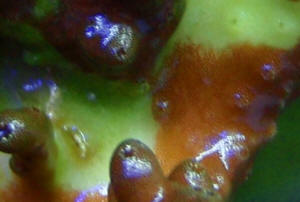 |
re: Acropora turning white 5/8/10
Thank you for the help. Sorry about the extra picture. Zach
<Welcome. Cranky Bob>
Re: Acropora turning white
Bob, I pulled it out and didn't see any worms or eggs. I put
in a Lugol's dip and blew of with turkey baster and
didn't see anything that looked like the flatworm pics
online. Is there another possibility.
<Actually several... from the ME meaning
"many">
Maybe Lugol's dip isn't the best way to get them off.
That's all I had at home from the options I found online. Any
thoughts? Thanks again for your help. Zach
<Oh yeah, for you to read; here: http://wetwebmedia.com/acrodisfaqs.htm
and the linked files above. Bob Fenner>
Re: Acropora turning white 5/12/10
Hey Bob,
<Big Z>
I finally found something on this Acropora. I used a Lugol's
dip again and several very small "bugs" came floating
off. I have since noticed them crawling around the bottom of the
tank. The largest one may be close to 1/4", they seem to be
a white/grey color, have antennas, and a lot of legs. I looked
online and the closet thing I could find to what it looks like is
some sort of amphipod. They are so small that I can't take a
picture to send. They only seem to be eating this one Acropora.
The others are fine. Could you send me a link to the site that
addresses how to get rid of these
things. From my reading and what I have found so far it looks
like I will have to trap them. Is that correct? Does anything eat
them? Thanks again for your help. The website is a nice
resource.
Thanks, Zach
<... am surprised you can't find the files yourself...
Please scroll down here: http://wetwebmedia.com/CnidIndex2.htm
to Acroporids... Disease/Pests... B>
|
|
Coral Disease 01/06/09 Dear Crew: Happy New Year! <To
you and yours tambien!> I hope all is well on your end. Attached, please
find two photographs of diseased corals. One is a Montipora Digitata and
the other a Montipora Capricornis. Both have been doing well, for three
years without incident. <Wow, well done.> This disease is spreading and
from the photographs, you can possibly see some black specs forming in
the area of dead coral. Do you have any ideas on what this is and how to
combat it? <Can you look closer at these black specs and see if they are
moving? Are they mobile things? To me, they look a bit like algae
growing on dead coral right now... but I can't tell from the photos. I
have heard "rumors" of something like "black red bugs"- parasitic
copepods that are black, rather than red. But I don't know what they are
or even if that's what's going on here.> No new specimens have been
added to this tank for several years now. <Very strange. Have you
changed anything at all with the system? New lights? New supplements?
Anything?> Thank you for taking the time to look. Best regards, Brad in
Basalt <Best,
Sara M.>
|
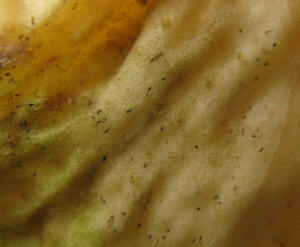 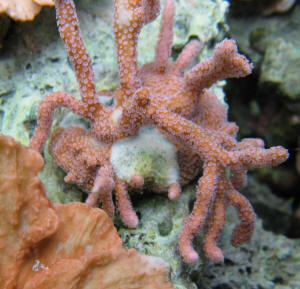 |
|
ID help 01/06/09
These are pictures I took, I'm being told they are not
redbugs. But from what I can find they appear to be to me. So
I'm turning to a pro. I apologize for picture quality but
it's the clearest I could get. Thx. Paul <... could be
Tegastes... can't tell from these images. Bob Fenner>
<<Bob... should have referred the querior to more... at
least the newly placed pitch for some of my pet-fish
presentations... the next one coming up this month... re
Hitchhiker Pros/Cons... will do so here:
http://wetwebmedia.com/LR,LS/HH%20PPT%20Pitch%20Cells/HHProsConsart.htm>>
|
 |
Red Acro Mites 2/10/06 Hey Crew, 2 of my Acros have tiny
red bugs on them. the polyps on the coral are in because they are
probably stressed out. i have a fridmani, but he isn't interested.
he prefers spaghetti and meatballs!! i am concerned. i did a google on
wet web media and didn't find any real solutions. please advise...
best regards, Jenna <Read: http://www.wetwebmedia.com/acrodisfaqs.htm and the linked
files above. Bob Fenner
Red Acro Mites II - 02/11/06 Hey Bob, thanks for your
help...... <<EricR here this morning...>> Well, I looked
through the link you sent, and found that Interceptor will kill bugs,
but all my crabs as well!! <<Indeed, as well as other beneficial
life! (amphipods, mysids, etc....maybe even beneficial
protozoa...)>> No good right? <<Not in my opinion,
no.>> I love my critters... <<And your tank loves them
too.>> I also did a Google search, but no info really.
<<Agreed>> I assume it is not really known what to do
right? <<As I am aware, there aren't any
"scientific" studies on these critters and their impact in
aquariums/captive systems.>> All my Acros are infected now,
and they are stressed out. Color is fading, and polyps are closed. They
will probably die, if I don't fix this... <<Jenna...I have
red bugs (Tegastes) in my reef tank for more than a year now, more
likely more than two. I have not lost any corals due to them, and
color/growth/vigor has not been affected by them...in my opinion. I
have not and will not "nuke" my tank to get rid of them and
quite honestly, don't give them a second thought (an attitude that
admittedly, has drawn scorn and caused me to be shunned by the
"fraggers" in my local reef club...but I digress...). My
point is; and I'm not saying this is the case in your situation, I
think many aquarists are quick to blame their own mistakes in choosing
proper tank-mates or inadequacies in water
quality/lighting/flow/feeding on the Tegastes. Just my humble
opinion...no "proof" either way at the moment. But for your
own peace of mind, if the corals in question can be removed from the
display tank you do have a couple options you can try. You could place
the affected corals in a bucket of tank water with a powerhead and
heater and treat per instructions with the Interceptor...or...you could
simply give the corals a 15 second bath in temperature and pH adjusted
RO water...though the second option is harder on the coral. And do be
aware, neither of these options guarantees the corals won't become
"reinfected" once reintroduced to the display. I don't
know that all this helps you much but as you've discovered for
yourself, aside from anecdotal evidence or knee-jerk reaction,
there's not much to go with. Regards, EricR>>
White bugs eating my Acro. - 03/22/06 WWM Crew,
<DG> Thanks for your help with all our fishy needs. This morning
I had a possible revelation on a very big mystery, Why my Acros were
dying (RTN). I moved a rock in the tank and some sand fell on some of
my corals, so once I placed the rock back I tried to clean my coral of
any debris that might of fallen on them. When I came to the Acro in
question ( a beautiful specimen that once had blue tips) I inverted the
coral to allow gravity to clean off any debris, and I noticed that some
"grains of sand" remained, being the persistent perfectionist
I pretend to be, I placed the specimen in front of the return to allow
the flow to take the sand off. Well upon, looking closer I realized
that the "sand" wasn't sand at all, they are little white
bugs all over the specimen. Now, I've read on WWM about red bugs
that eat Acros, and of white Nudis that eat Montis, but not white bugs
that eat Acros?! <Come in all colors...> Can somebody lend
advice? Is there any solution other than laying the coral in bleach and
turning it into a very sadistic paperweight? <There are possible
predators to try> I know for a fact that they will move on to other
pieces. The specimen that has them now was fine and I'm suspecting
they came on another specimen that already had bits of RTN. Your
suggestions and advice are both greatly needed and appreciated.
Sincerely yours, David Guzman Jr. <Do consider stocking some small
wrasses... see WWM re other groups of fishes... Do quarantine future
purchases... Bob Fenner>
Yellow with a red dot Acro bugs 5/3/04 Hi, I have some
Acropora corals that are infested with little yellow oval shaped bug
like things on them. I am afraid that they are hurting or eating the
Acropora corals. How can I get rid of them? I have a yellow Coris
wrasse and a mandarin fish but they are not eating the bugs. If I use
SeaChem's coral dip, will it kill these pests? Thanks, Adam <Hi
Adam. Adam here<g>. There is much debate about these critters and
why they appear, what they feed on, if they are harmful, how to get rid
of them, etc., etc. Some folks have had success with predators,
commensal crabs or clown gobies, but none are 100% reliable. I never
like to send anyone elsewhere for info, but I don't have any first
hand experience and there is A LOT of discussion in the forums at
www.reefcentral.com. Good luck! Adam>
Red bugs on SPS hi, Bob, how's going? << Blundell
here as well. >> This is George in SDMAS. << Hey George,
hope all is well. >> Got a question for you about red bugs. I am
sure you probably read some posts online about it. Some ppl use a heart
worm medication call "interceptor" to get rid of the red bug.
Supposedly the only side effect known at this point is that the
medication kills most if not all the crustaceans and everything else
seems to do fine. << Wow, I wouldn't call that all
successful. If it kills all the other crustaceans then I would stay
clear of that method. >> Someone also said that pipe fish eats
the red bugs. So I decided to do an experiment. I have Ron got me some
dragon pipe fish. I put them in my refugium/frag tank. Saturday they
feel comfortable enough, the male start to compete against each other
to see who is most handsome and the female pipe fish just doing
whatever they are doing like nothing is going on. So I dropped a SPS
colony that has red bugs on it in the refugium/frag tank. So far I only
observe 2 pipe fish swim onto the colony look around for food, but some
how they didn't eat any of the bugs. SO they either don't
realize those bugs are food, or perhaps not that hungry, or some how
they can't see them. Since pipe fish aren't build for living in
rough water, so I am more leaning toward they don't know what the
red bugs are. <Me too> << Definite possibility. But with
time, and hunger, they may go for it. Or, is possible that the red bugs
aren't food at all for them. >> I am planning on feeding the
pipe fish some Cyclops eeze tonight by squirt some into the SPS colony,
hopping maybe the pipe fish will eventually associate the bug and food
together. But of course they have to start eating the Cyclops eeze
first. << Good idea, and just about everything will go for
Cyclop-eeze. >> My question is that from all your dives and
observations when you were diving. Do you know if any
fish/shrimp/crab....etc that live in the reef that might eat these red
bugs?? <I don't, but suspect there is definitely some
predator/s> << I would think a wrasse would be the best
choice. Probably trying a rock mover (dragon wrasse) or six line
wrasse. >> If you do, I would appreciate if you let me know. I am
sure I can spend money and try all the reef safe fish that I think
might eat things like red bug, but don't have that kind money to
throw around. << I wouldn't spend any money on chemical
treatments. I would stick with fish (wrasse) or maybe even a Mithrax
crab. >> Hope to hear from you soon. Have a great day! Sincerely,
George <Hey George. Am sending your note/query to our Crew... as
they are much more current on this issue. Be seeing you, Bob F>
<< Blundell >>
Acropora "mites" AKA 'Red Amphipods" I
have a 10 gallon nano with some small SPS frags and I have notices
small orange mites crawling around on a couple of the Acropora frags.
<Ahhh, yes... not uncommon at all. A curious little arthropod. AKA
"red Amphipods"> They look like little fleas. They are
very small but viewable to the naked eye. What can be done? <some
say they are parasitic, but I and most aquarists do not believe this to
be true. No proof yet. At best they flourish incidentally while SPS
corals wane/die from other common denominators (water quality, lack of
QT, etc)> Is there a safe dip or treatment I could give? <some
have employed FW dips... I do not believe this is necessary> Are
these parasitic or commensal? <the jury is still out... leaning
towards commensal> I have searched and found no information on
these. <do a keyword search on reefcentral.com and other large
message boards for perspective (use "Red Acropora Mites",
"Red Amphipods", etc.) to get a consensus. My advice is to
simply watch carefully and do employ a natural predator if possible
(Red Sea Pseudochromid, small wrasse, etc)> Thank you ahead of time
for any help. <best regards, Anthony>
Red bugs on SPS hi, Bob, how's going? << Blundell
here as well. >> This is George in SDMAS. << Hey George,
hope all is well. >> Got a question for you about red
bugs. I am sure you probably read some posts online about
it. Some ppl use a heart worm medication call
"interceptor" to get rid of the red
bug. Supposedly the only side effect known at this point is
that the medication kills most if not all the crustaceans and
everything else seems to do fine. << Wow, I wouldn't call
that all successful. If it kills all the other crustaceans
then I would stay clear of that method. >> Someone also said that
pipe fish eats the red bugs. So I decided to do an
experiment. I have Ron got me some dragon pipe
fish. I put them in my refugium/frag
tank. Saturday they feel comfortable enough, the male start
to compete against each other to see who is most handsome and the
female pipe fish just doing whatever they are doing like nothing is
going on. So I dropped a SPS colony that has red bugs on it
in the refugium/frag tank. So far I only observe 2 pipe fish
swim onto the colony look around for food, but some how they didn't
eat any of the bugs. SO they either don't realize those bugs are
food, or perhaps not that hungry, or some how they can't see
them. Since pipe fish aren't build for living in rough
water, so I am more leaning toward they don't know what the red
bugs are. <Me too> << Definite possibility. But
with time, and hunger, they may go for it. Or, is possible
that the red bugs aren't food at all for them. >> I am
planning on feeding the pipe fish some Cyclops Eeze tonight by squirt
some into the SPS colony, hopping maybe the pipe fish will eventually
associate the bug and food together. But of course they have
to start eating the Cyclops Eeze first. << Good idea, and just
about everything will go for Cyclop-eeze. >> My question is that
from all your dives and observations when you were
diving. Do you know if any fish/shrimp/crab....etc that live
in the reef that might eat these red bugs?? <I don't, but
suspect there is definitely some predator/s> << I
would think a wrasse would be the best choice. Probably
trying a rock mover (dragon wrasse) or six line wrasse. >> If you
do, I would appreciate if you let me know. I am sure I can
spend money and try all the reef safe fish that I think might eat
things like red bug, but don't have that kind money to throw
around. << I wouldn't spend any money on chemical
treatments. I would stick with fish (wrasse) or maybe even a
Mithrax crab. >> Hope to hear from you soon. Have a
great day! Sincerely, George <Hey George. Am sending your note/query
to our Crew... as they are much more current on this issue. Be seeing
you, Bob F> << Blundell >>
|
|

